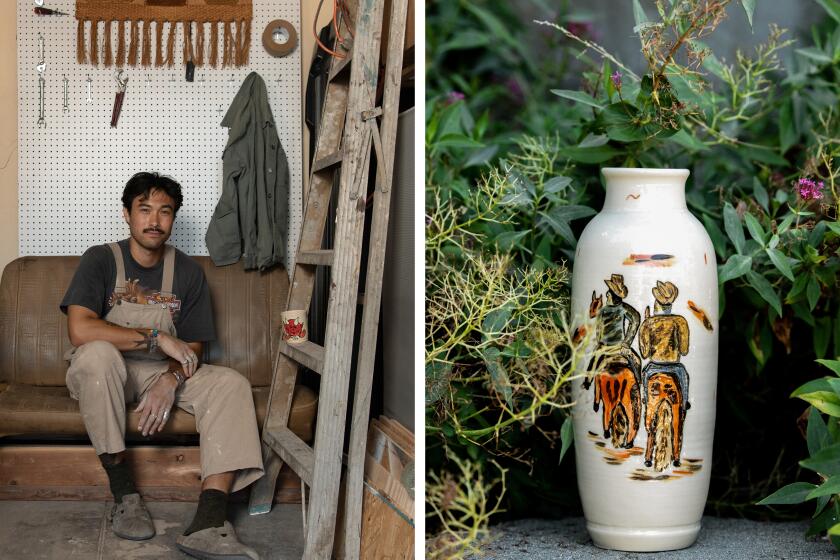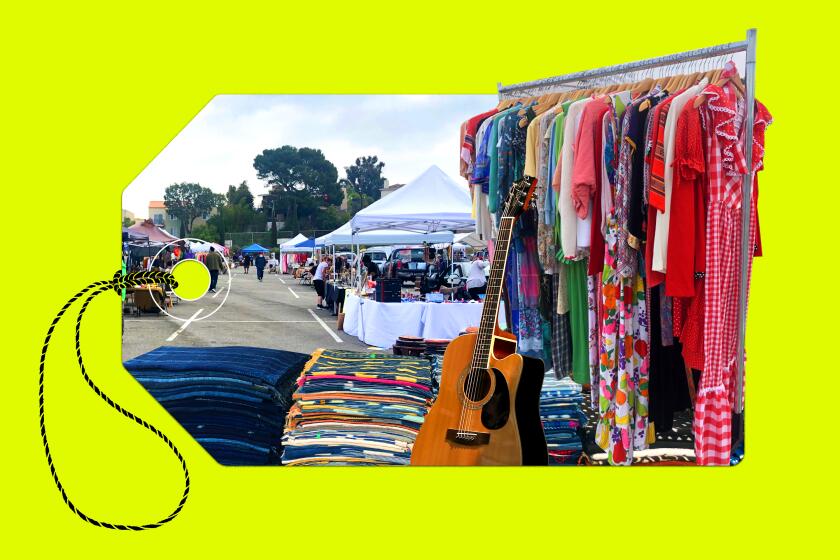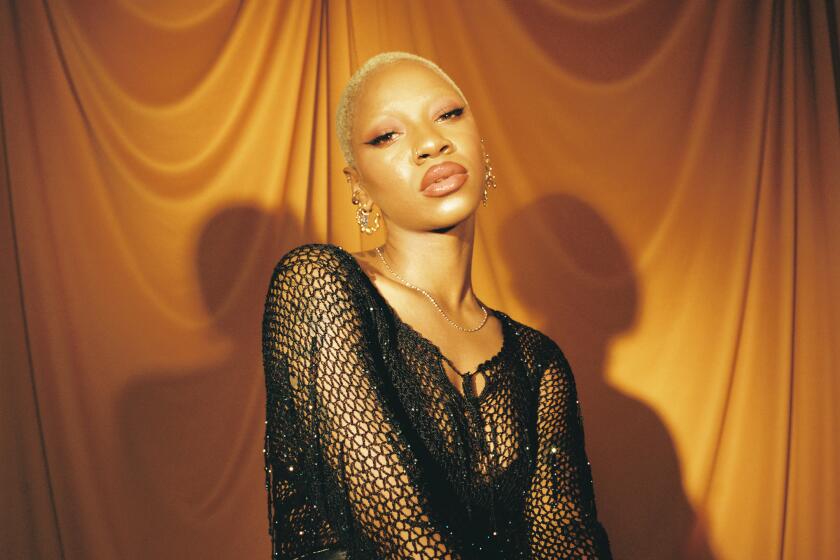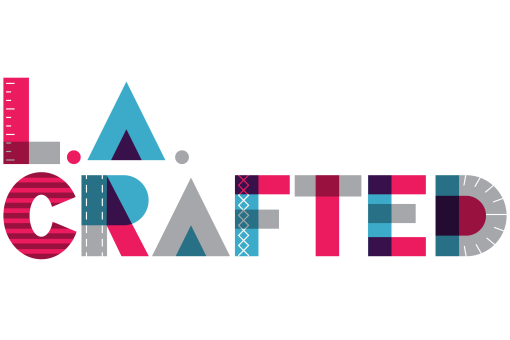Kailyn Brown is a lifestyle reporter for the Los Angeles Times. Previously, she worked as a staff writer for Los Angeles Magazine and the Las Vegas Review-Journal. When she’s not penning an article, she’s DJing at events and parties around the city.
- Share via
1
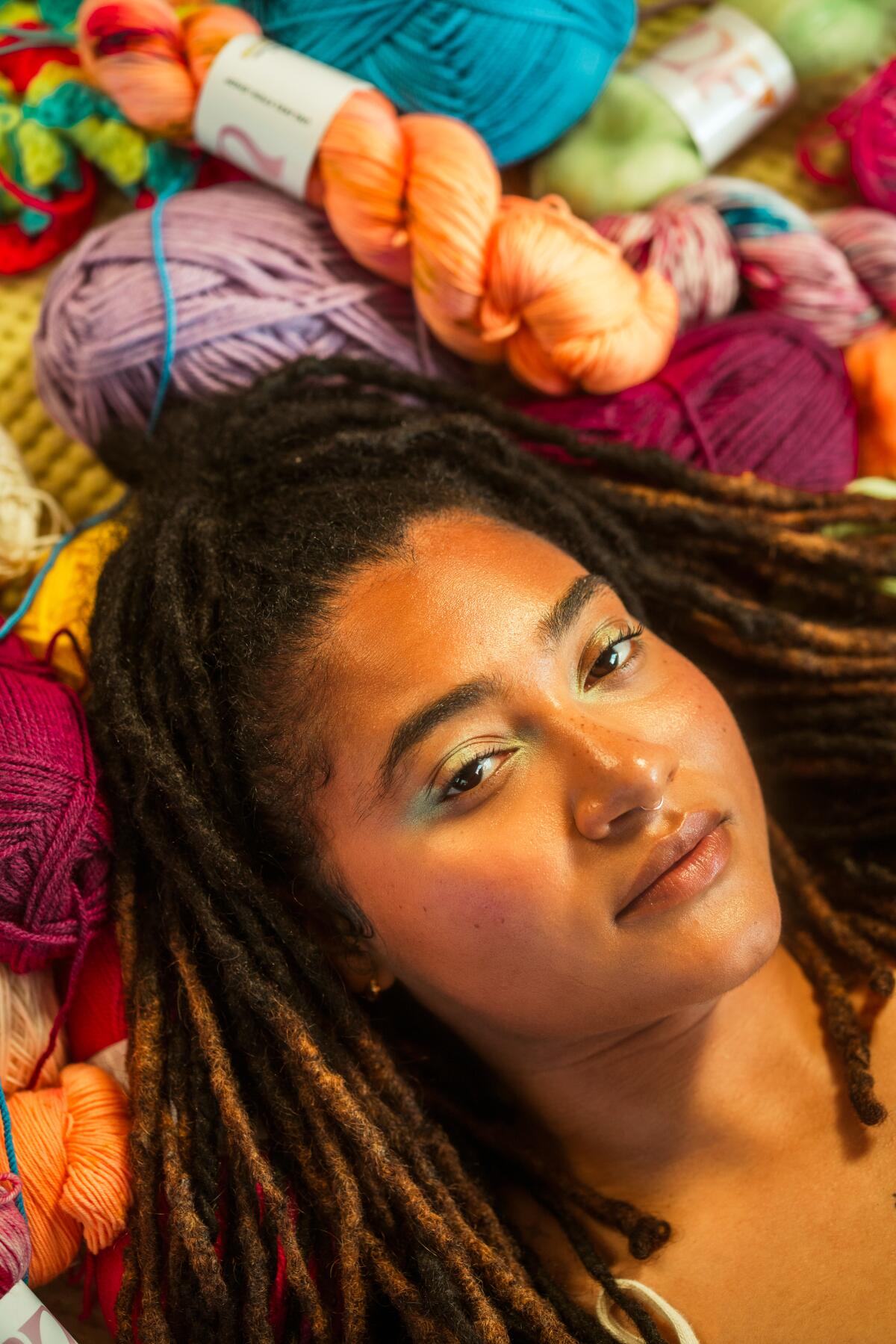
Krysta Grasso, 27, is the owner of the crochet brand Unlikely Fox.
Surrounded by a sea of colorful yarn, 27-year-old Krysta Grasso lounged on her bed in her West Adams apartment as she crocheted a custom order.
With the yarn in one hand and a crochet hook in the other, she intricately worked in more of the neon pink, highlighter yellow and tortoise blue that she’d hand-dyed in her kitchen. When she was finished, she held up her creation: a fox-ear hat, one of her signature pieces.
Grasso’s crochet brand, Unlikely Fox, is having a shining moment — her designs have been spotted on several musicians, including Grammy -winning rapper Kendrick Lamar, Malaya (who wore a hat during an NPR Tiny Desk performance) and Amindi.
Still, despite the recent fanfare, Grasso’s days haven’t changed much. This peaceful afternoon looks a lot like the ones she used to spend with her mother, Dunia, who taught her to crochet when she was about 5. Together, they’d sit on the couch, watching cartoons and romantic comedies for hours as they crocheted everything from scarves to granny squares, which they sometimes turned into blankets.
Grasso enjoyed crocheting simply because “my mom did it,” she said of Dunia, whose signature is tattooed in red on her left forearm. “I just always wanted to be like her. Most of the things she did, I just wanted to do naturally.”
Daniel Dooreck’s fascination with motorcycles, flash tattoos and cowboys comes alive in the hand-thrown vessels he creates in his tiny Echo Park garage.
For many years, crocheting was just a hobby for Grasso, who goes by the nickname Fox. She comes from three generations of seamstresses in her Caribbean family — her grandmother owned a sewing boutique in the Chicago area, where Grasso grew up. As a teen, she would sell DIY clothes on Etsy. But it wasn’t until her mother suddenly died in June 2018 from cardiac arrest, just days after having a stroke, that Grasso started crocheting with a new vigor.
At first, it was her way of grieving, an attempt to find bits of joy within each day. And then it became something even more.
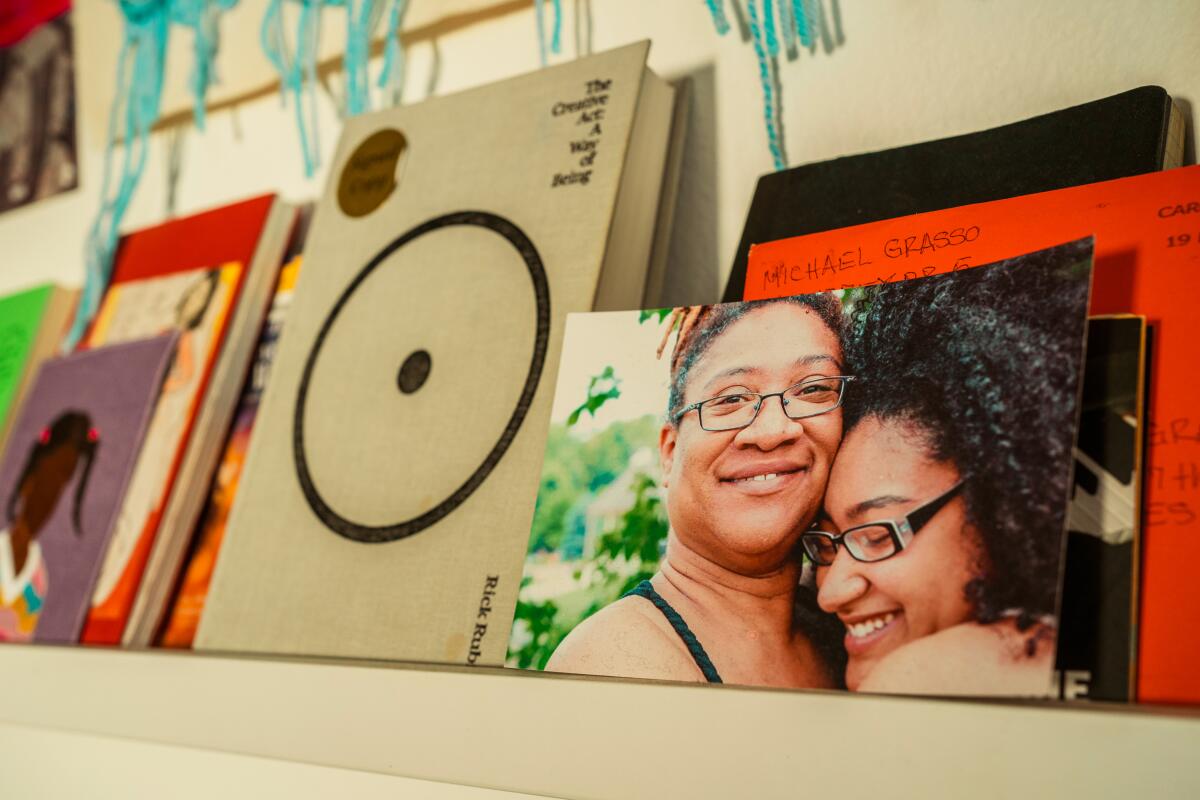
A photograph of Krysta Grasso and her mother, Dunia, is displayed in Grasso’s bedroom and crochet studio.
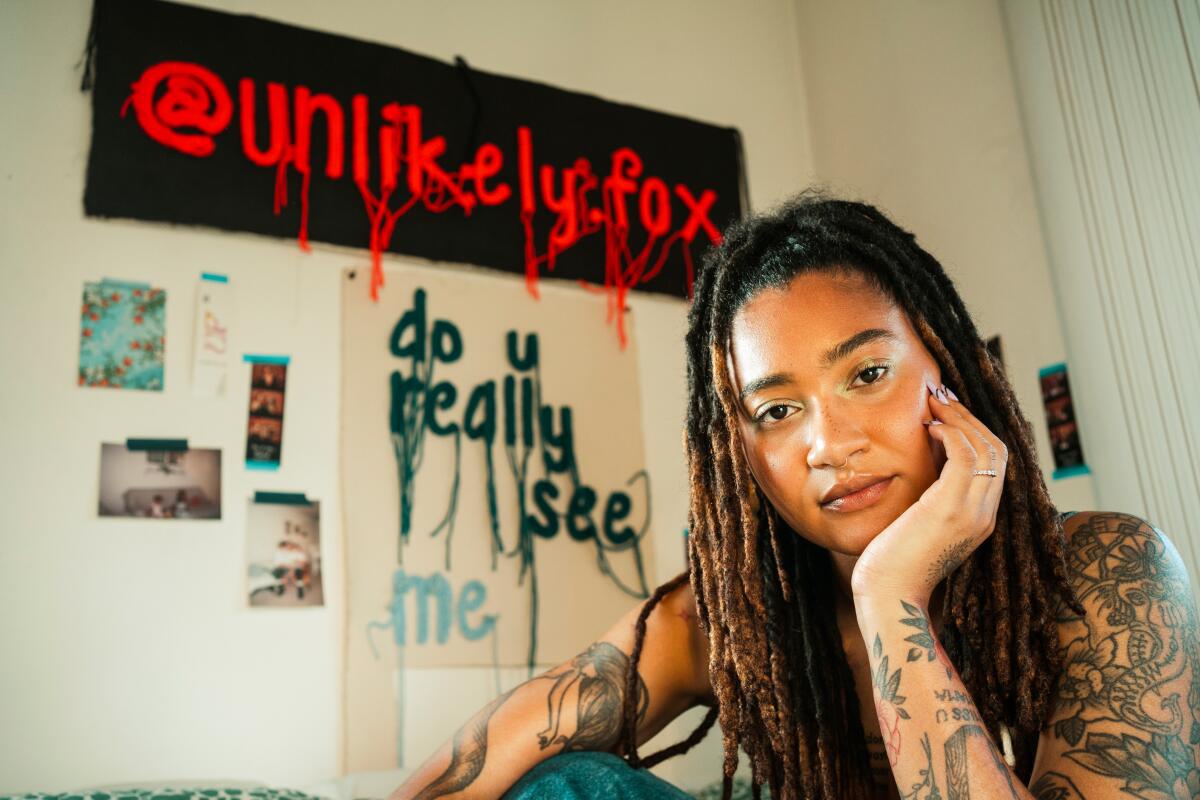
Krysta Grasso, who is owner of Unlikely Fox, likes to keep the strings loose on her crochet products to showcase the colors and textures she uses.
“After she passed, I realized how deeply connected my crocheting was to her,” Grasso said of her mom, who raised three kids on her own. “I was really motivated to start doing it for a living.”
As she crocheted, Grasso would listen to the Spotify playlists her mom made, which were filled with reggaeton, R&B and soul tracks, and watch their favorite Christmas films. Grasso made vibrant colored hats, swimwear and sweaters. She also started designing crochet sleeves and front hoodie pockets, which she added to vintage T-shirts. “When I’m sad, I tend to gravitate to bright colors,” she said.
Shop for unique items at these outdoor flea markets in and around Los Angeles. From Long Beach to Ventura, we’ve selected our favorite spots.
While Grasso looked for a job in L.A., she began selling her products at the popular Melrose Trading Post. At the time, she was one of a few crochet artists there. She didn’t make much money in the beginning, but she always received the same compliment from patrons. “People would say, ‘I’ve never seen anything like this before,’” she said, adding that they were intrigued by her use of color.
She eventually found a job as a server at a restaurant but was laid off when the pandemic hit. With more free time, she began experimenting with color and hand-dying her own yarn for her crochet work. The hours-long process goes like this: She soaks yarn in citric acid, then places it in a pan on the stove that’s filled with a mix of hot water and dye and lets it sit for a set amount of time to absorb the color. This can take anywhere from 30 minutes to two hours. Afterward, she takes the pan off the heat to let the yarn cool off, then washes it and lets it dry.
“Color is the thing that I love most about the entire craft,” she said, adding that she’s also intrigued by various textures. In one piece, for example, the fox-ear hat, Grasso may use up to 25 combinations of different colors. She likes to keep the strings loose on her pieces — a distinct style choice — to show how many colors and fibers she uses in her products. No two items are ever the same.
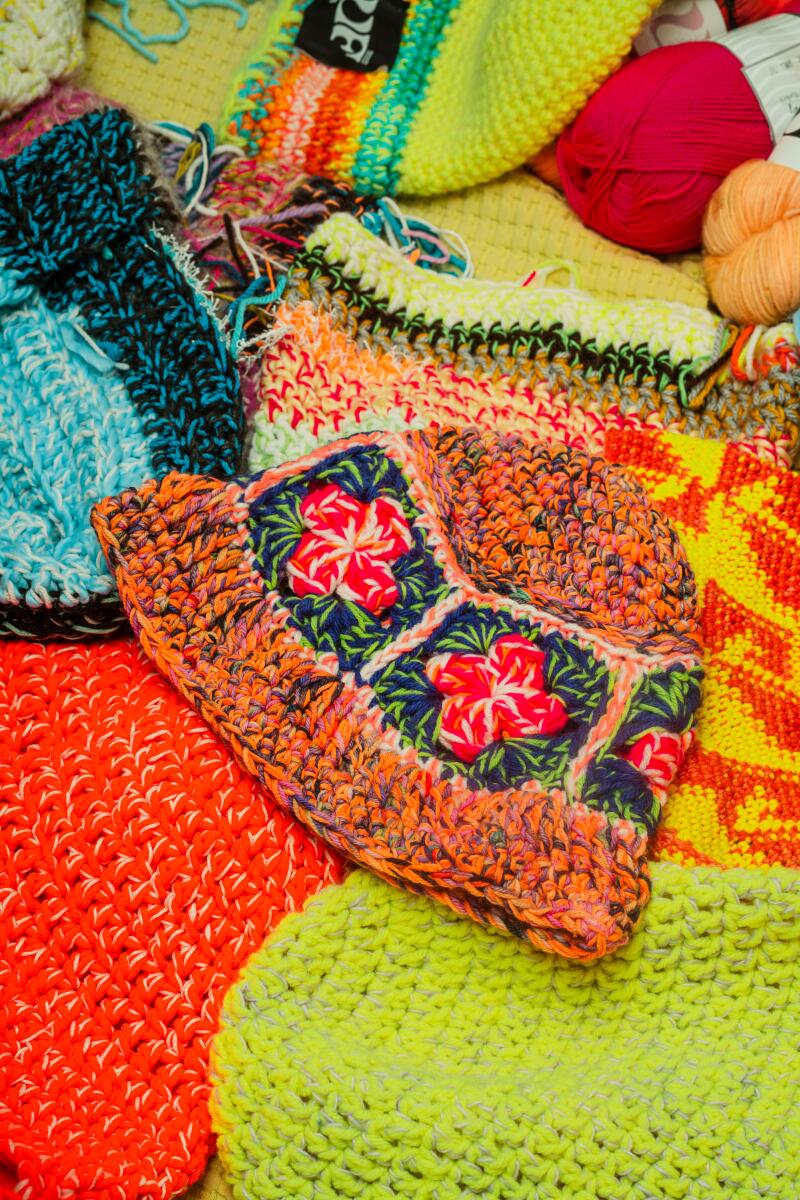
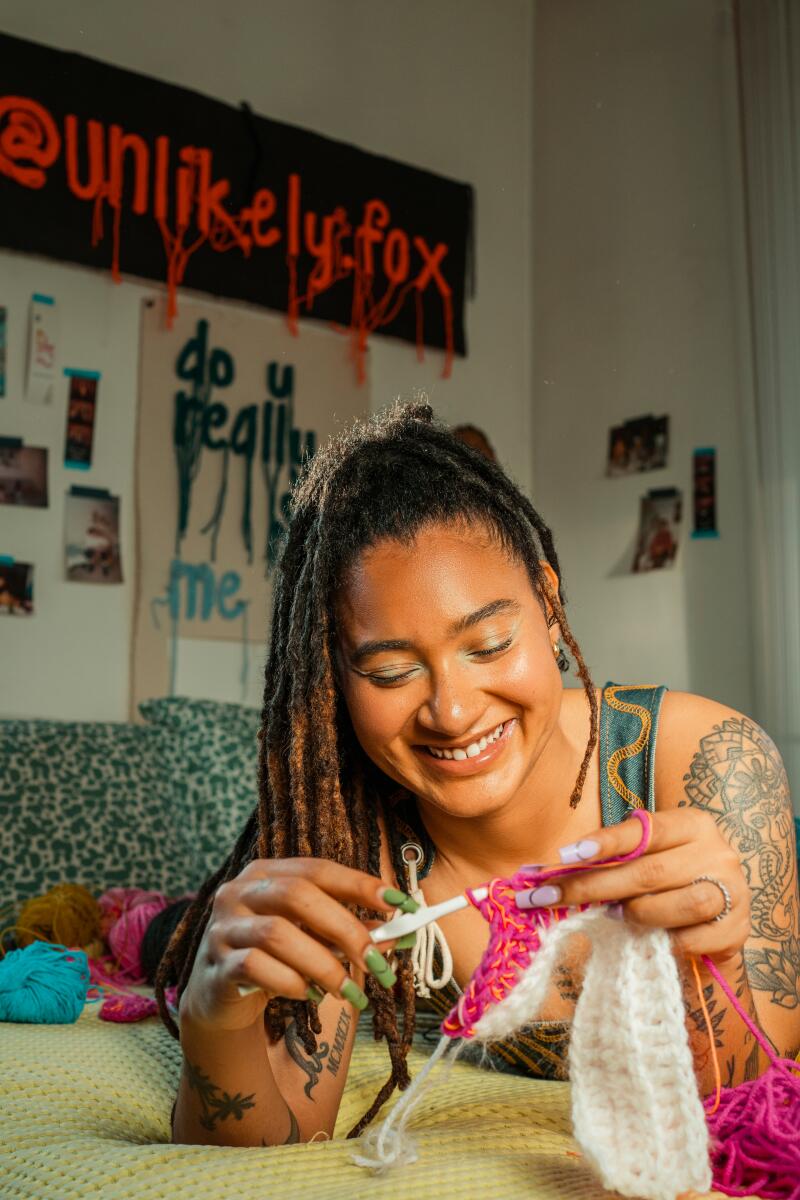
Grasso may use up to 25 combinations of colors for her most vibrant crochet projects.
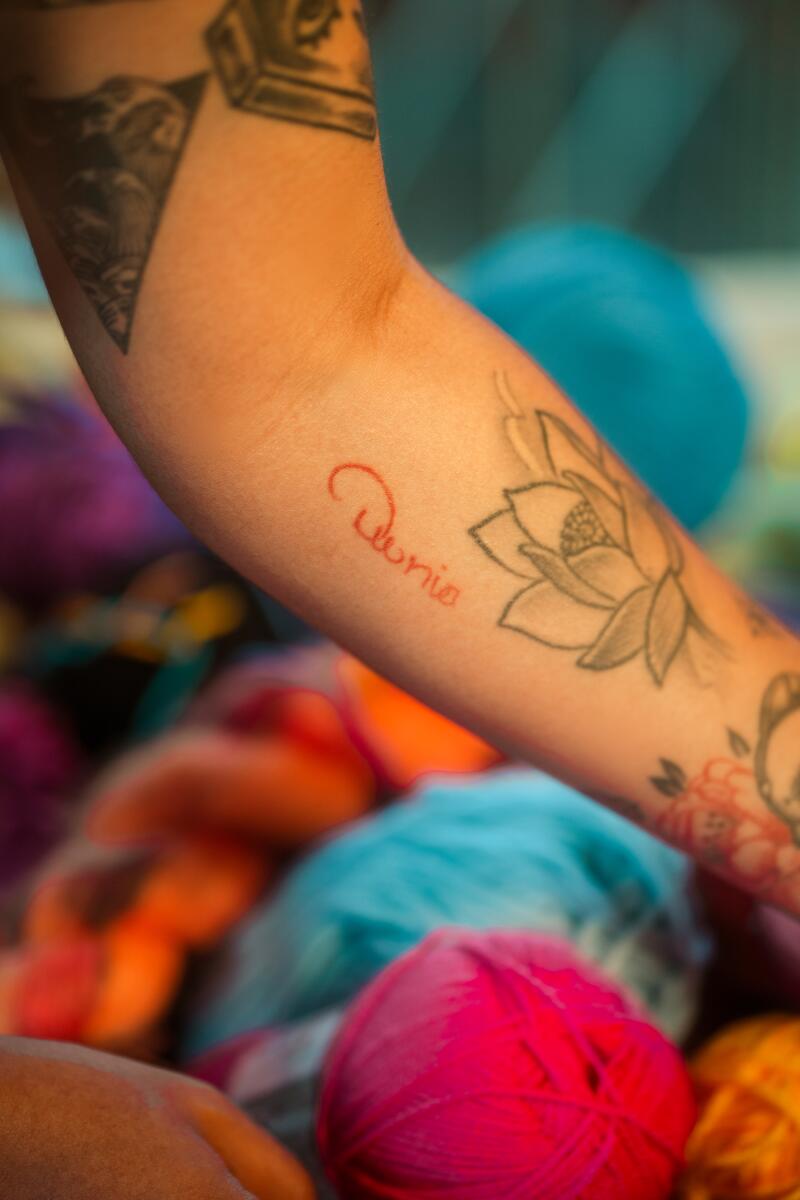
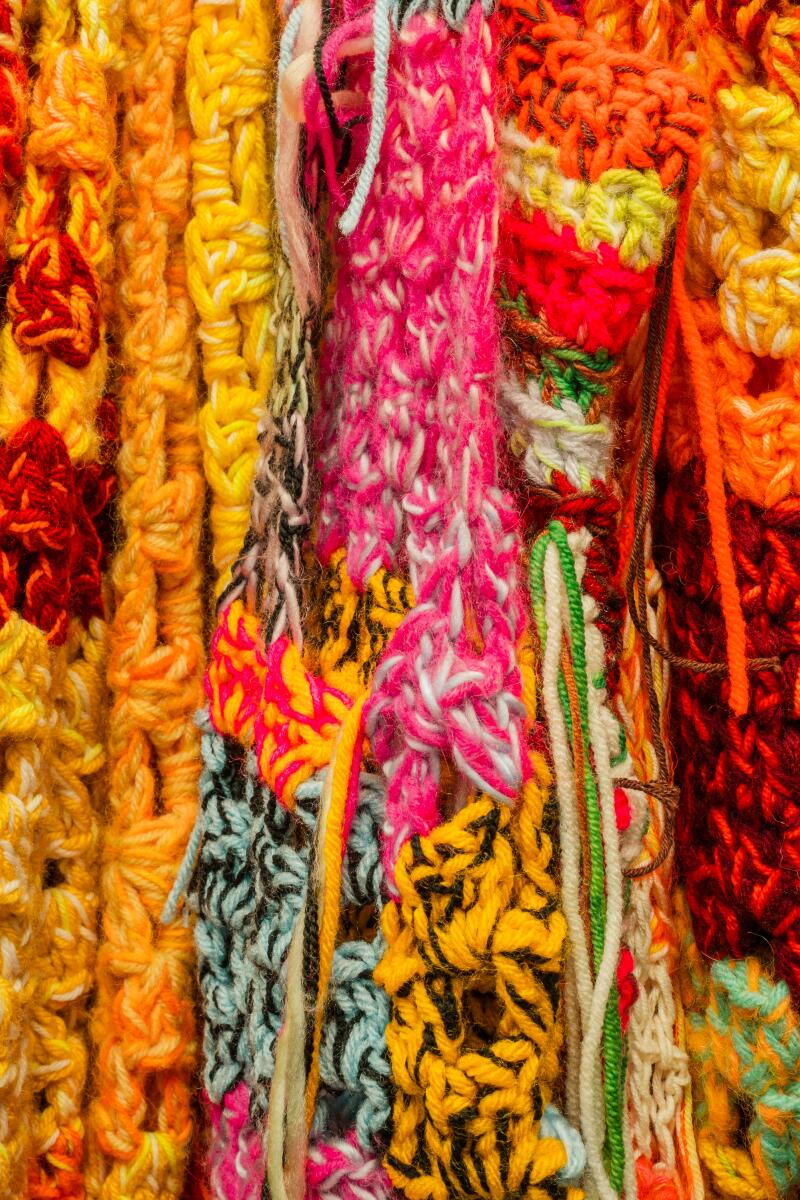
Grasso has her mother’s name, Dunia, tattooed on her arm. Grasso uses a mix of fibers — mohair, merino wool, cotton, silk, recycled fibers and dead-stock acrylic.
Grasso typically uses a mixture of fibers — mohair, merino wool, cotton, silk, recycled fibers and dead-stock acrylic — to avoid buying too much acrylic yarn, which often ends up in landfills because it is produced in abundance and isn’t used quickly enough, she said. The higher-priced fibers are the reason her hats sell for $190 and clothing pieces cost $300 to $1,500.
In early 2021, Grasso started selling skeins of her hand-dyed yarn online, which were a hit. When she released a collection called the “Steven Universe” Yarn Club, based on the Cartoon Network animated series, she made nearly $10,000 in two days off the yarn, which was priced at about $25 to $30 per skein.
“I was incredibly surprised. I’d never had a drop that big. Things definitely changed,” she said. She was working at a bookstore at the time, but this made her realize that she could potentially make Unlikely Fox her main source of income.
Soon after, she quit her job and continued doing monthly yarn drops, all inspired by animated shows, video games and movies she liked, including “Chowder,” “Animal Crossing,” “Rick and Morty” and “The Princess and the Frog.”
Black Market Flea is something to be felt. As much as it’s a showcase of L.A. streetwear brands, artists, healers, it’s a showcase of love.
By that fall, Grasso was selling at the Black Market Flea, a monthly flea market that is brimming with clothing brands and handmade goods, all designed and crafted by Black artisans. Before long, her Unlikely Fox products were selling out, and she was able to make half her income from the market and the other half from her monthly yarn drops.
“I think the Black Market Flea was my target audience,” she said. “Those are my peers, and I think it was much easier to communicate what I was doing to people who looked like me, rather than being a small group of people of color and Black people in such a huge white space.”
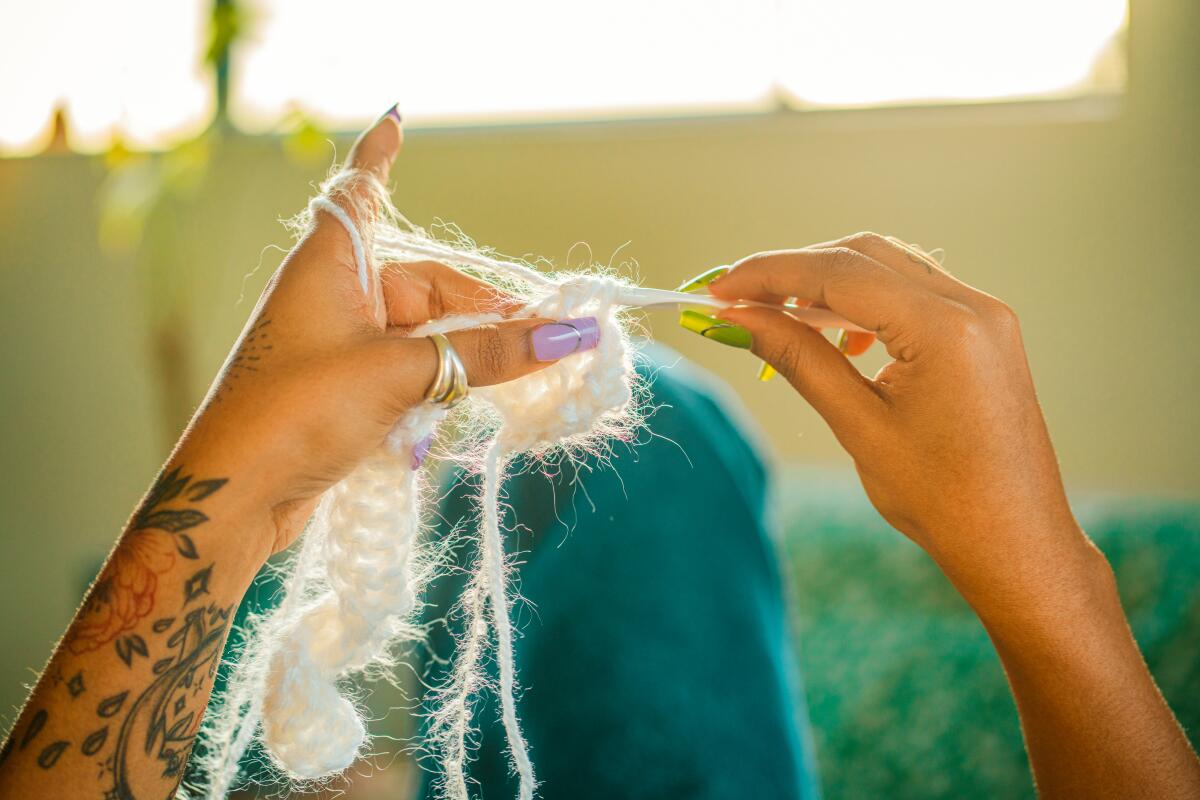
Krysta Grasso said each item she crochets is personal and feels like “a piece of me.”
There aren’t many times that you’ll see Grasso without a crochet hook and yarn in her hands.
Stephanie Smith first met Grasso when she was crocheting outside a coffee shop in Leimert Park a couple of years ago.
“She was so zoned in and just doing it with ease, and I just thought that was so cool,” said Smith, a photographer, returning customer and now close friend of Grasso. “It was refreshing to see a younger woman crocheting.”
Smith owns about 10 of Grasso’s pieces, including a matching set — a wrap skirt and a bustier-style top with removable sleeves — that she customized for her 26th birthday. “I’ve bought other crochet items [from other designers], but her’s are woven way tighter, and her colors really stand out to me.” Each time Smith wears an Unlikely Fox piece, she said, people flag her down to ask where she got it.
Smith said she appreciates Grasso’s pieces even more because of how personal they are to her.
“I won’t ever get rid of these pieces ever because I feel like it’s a part of my friend and it’s also a part of her mother,” she said.
If you follow Grasso on social media, you know who her mother is. Dunia’s face, which is almost identical to Grasso‘s, is plastered across Grasso’s Instagram feed, and Grasso’s bio says simply “Dunia’s daughter.” Grasso has locs similar to those worn by her mom; she got hers shortly after Dunia died. Grasso also is candid online about days when her grief strikes even harder, and she shares the activities she does to help boost her mood, like crocheting and running.
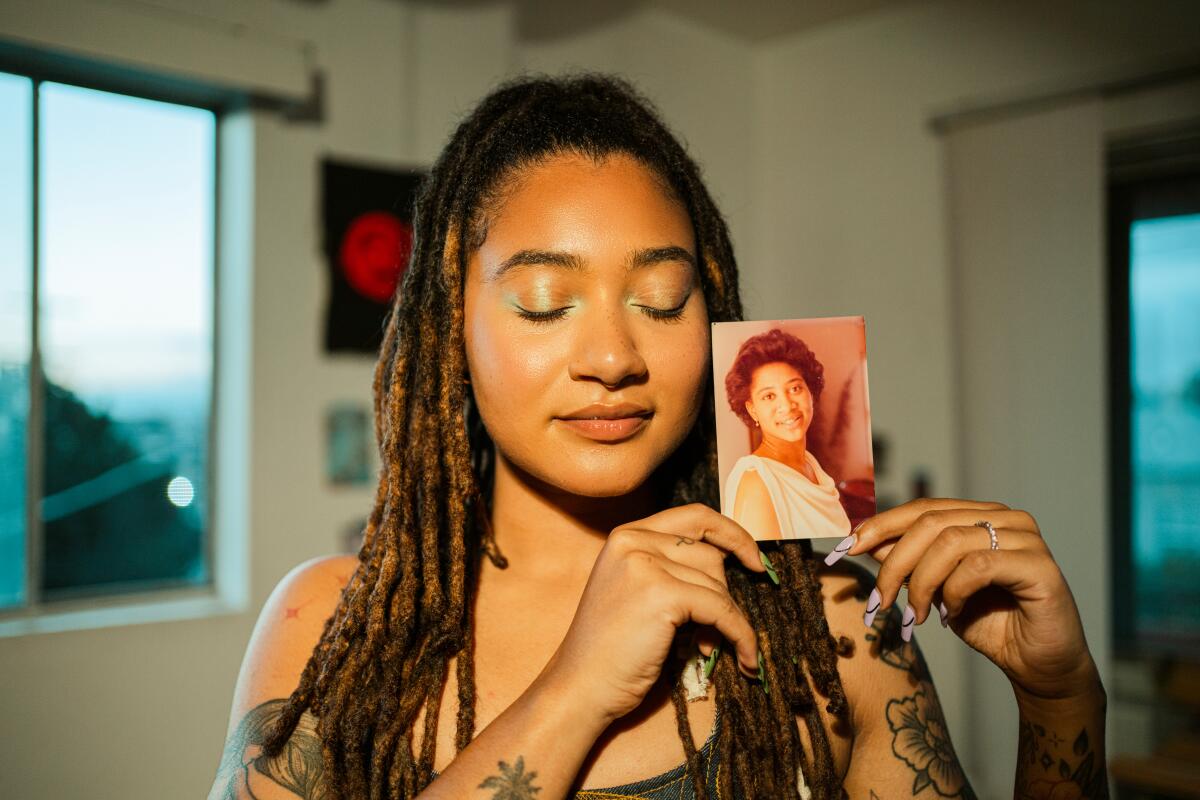
Krysta Grasso with a picture of her mother, Dunia, who taught her how to crochet when she was 5.
For Grasso, talking about her mom and her grieving process is a necessity. “I think I just have to,” she said. “When I don’t, I feel awful.”
Grasso opens up about her experience online not only because it helps her “but I also want to encourage people to grieve more outwardly. I think just the act of speaking about something, whether it’s painful or not, is really powerful.”
At times, it can feel conflicting for Grasso to sell her crochet work because it’s “a piece of me,” she said. For this reason, she recently shifted from doing flea markets regularly to focusing more on making commission-based pieces and selling limited drops online. That way, she doesn’t have to persuade anyone to buy her work, she said.
She isn’t focusing on Unlikely Fox full-time anymore because it was getting “intense.” This has given her the freedom to expand her business slowly and intentionally.
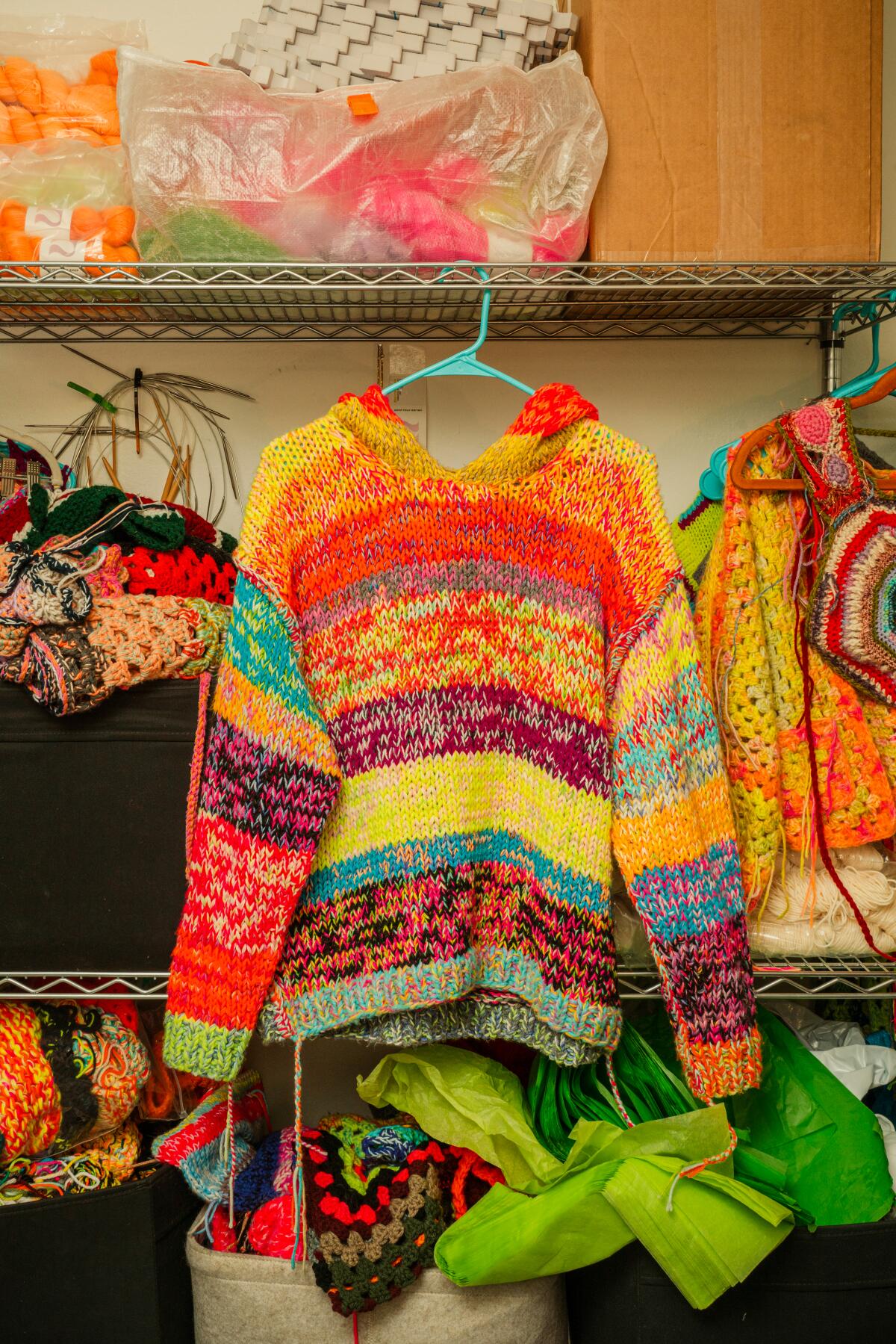
She didn’t grow up with a lot of money, she said, “so I know that I will be OK with less.”
In the fall, Grasso plans to move to Portland, Ore., to pursue a bachelor’s degree in graphic design, which she’s been passionate about for years. She plans to continue selling her crochet pieces and doing monthly drops on the Unlikely Fox website. Her long-term goal is to become a full-time knitwear designer and further her career in fashion.
When Grasso reflects on the brand she’s built in her mother’s memory, she says Dunia would think “it’s really cool.”
“I visualize the version of us that could’ve got to live longer together, and I think the two of us would’ve become even cooler people together,” Grasso said, as she stood in her bedroom and studio, which is filled with photos of her mom. “I think she’s proud. I think she just wants me to find my own [way] and not be influenced by the things that are around me and the people around me.”
She smiled and added, “I think she just wants me to keep going.”
In this series, we highlight independent makers and artists, from glassblowers to fiber artists, who are creating original products in Los Angeles.
